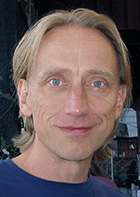DFF funds research in mathematical population genetics
Carsten Wiuf, professor in statistics at Department of Mathematical Sciences, has received a research grant of DKK 5,4 million from the Independent Research Fund Denmark.
 Together with his project partners from the Department of Biology and Aarhus University, Carsten Wiuf will study statistical and computational methods to infer human history from NGS data. Next Generation Sequencing (NGS), or deep sequencing, as it is called, enables sequencing of huge amounts of DNA.
Together with his project partners from the Department of Biology and Aarhus University, Carsten Wiuf will study statistical and computational methods to infer human history from NGS data. Next Generation Sequencing (NGS), or deep sequencing, as it is called, enables sequencing of huge amounts of DNA.
Complex interwoven patterns
Modern humans originated in Africa about 200,000 years ago. About 100,000-50,000 years ago, it had left Africa and spread across most of the globe to Europe, Asia and America. Over this long period of time, populations became divided into smaller populations and other populations became mixed together as a consequence of colonisations, conflicts, disasters and the migration of people.
Modern human beings came into contact with at least two archaic human species, namely descendants of the Neanderthals and descendants of the Denisovans in Oceania. These migration and expansion patterns might be compared to a spider web where the thread creates complex interwoven patterns.
These complex patterns might be inferred from genetic data from modern humans and human fossils.
The purpose of the project is to develop novel advanced mathematical and computational tools to perform this inference from large amounts of genetic data. A cardinal point is to understand population patterns using graph theory and how a graph can be determined from genetic data using statistical methods.
Carsten Wiuf's collaborators are Anders Albrechtsen, Center for Bioinformatics and RNA Biology at the Department of Biology, and Thomas Mailund, Center for Bioinformatics (BiRC) at Aarhus University.
Topics
Project details
Project:
Tangled webs of human splits and mergers – mathematical population genetics on graphs
Project period:
01-01-2019 - 31-12-2021
Funding:
5,4 millio DKK from the Independent Research Fund Denmark
Contact:
Carsten Wiuf
Professor
Department of Mathematical Science
wiuf@math.ku.dk
Tel.: +45 51 31 99 91
